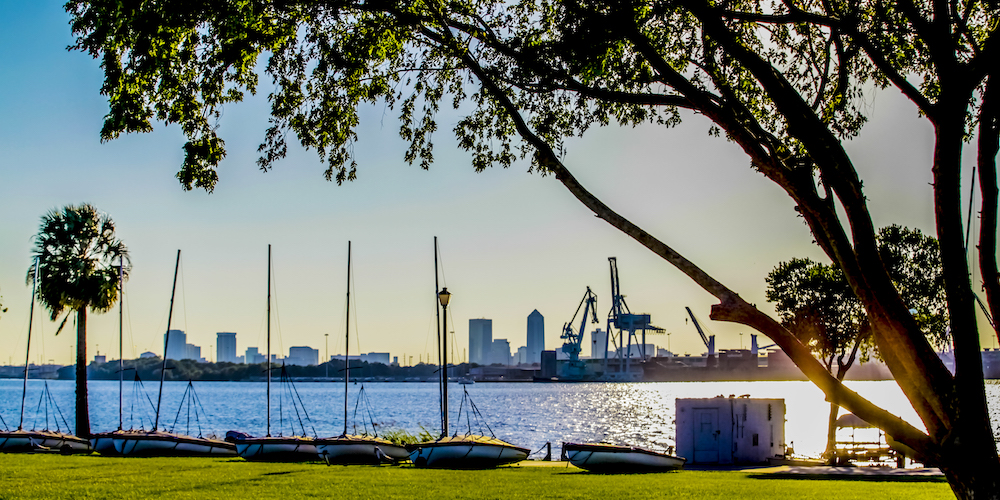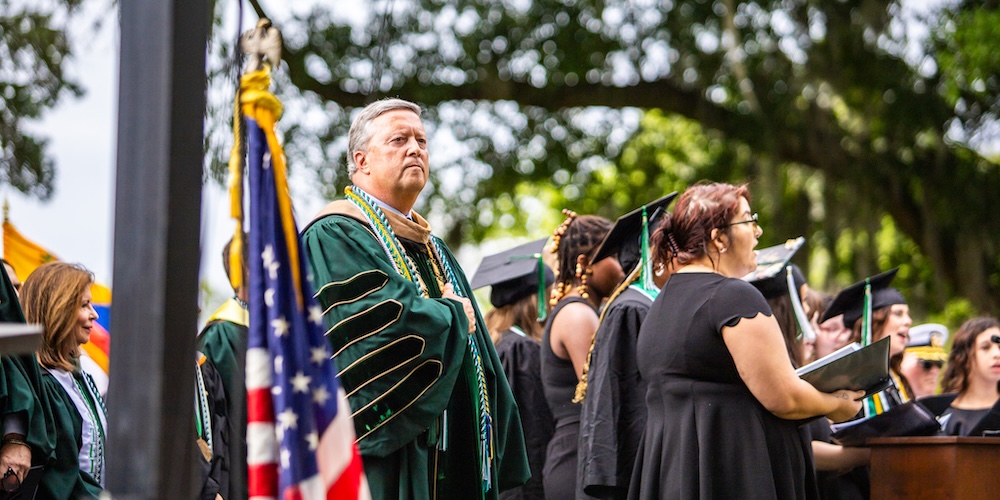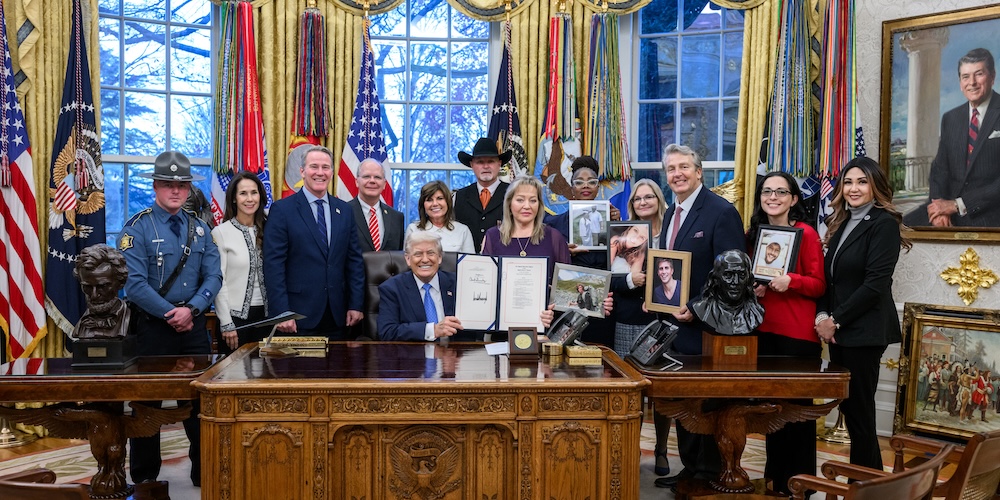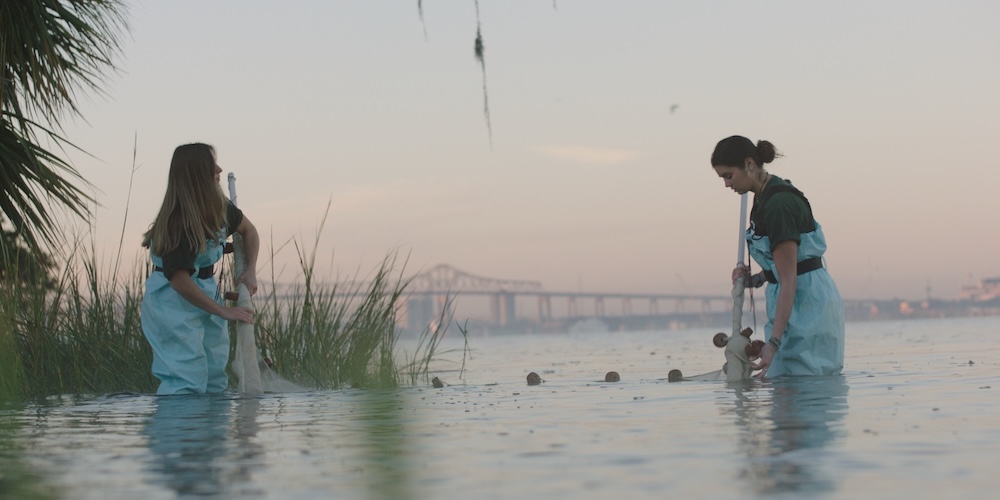One of the biggest changes at JU over the past 10 years is the focus on improving and protecting the natural beauty of campus. Stroll through the campus today and you’ll find green grass, blooming flowers, and sweeping views of downtown from the banks of the St. Johns River.
It wasn’t always that way. When President Cost arrived in 2013, he noticed the patches of dirt where grass should have been growing. Students were walking through landscaped areas because there weren’t enough sidewalks. The riverfront was an overgrown mass of swampy vegetation. And the JU mascot – a dolphin – was nowhere to be found on campus.
President Cost raised the bar of expectation for these basic –but foundational – elements of the campus experience and overall learning environment. He set out to make JU one of the most beautiful campuses in the country. And today it is.
“There's no other campus like Jacksonville University out there,” said Alex Boylan ’99, who returned to campus in 2022 to film an episode of “The College Tour” for Amazon Prime. Boylan is executive producer, host and creator of the hit show, now in its eighth season.
Boylan has a unique perspective as a student-athlete recruited from the suburbs of Boston to play soccer for JU in the 90s. It was a far different experience back then, Boylan said.
“The waterfront used to be kind of a mini swamp, to be honest. It was just overgrown vegetation,” he recalled. “You couldn’t really get to the river, so as a student, you weren’t even thinking about the river.”
To showcase one of the University’s best assets, President Cost made the strategic decision to clear the waterfront and make it more inviting for everyone on campus. Today, students hang out on Dolphin Beach or jog around the scenic Cost Trail that passes the river near Kurzius Pavilion. Marine Science students take water samples and conduct river research, and the sailing and rowing teams train on the water daily.
President Cost also added more sidewalks to create a more walkable campus, and today you’ll see the JU mascot represented in big and little ways across the grounds, including the iconic Dolphin statues in the main quad.
“This is not the same campus as when I went to college here,” Boylan said. “Being back to film it myself with [The College Tour] crew and the other executive producers, it’s just so beautiful. That Spanish moss dripping from the trees everywhere you walk. It's magical.”
“As I've gotten to know President Cost and understand his vision, we as alumni should be so proud. Every decision makes sense, creates a better student environment, and makes me a proud alum,” Boylan said.
A LIVING LABRATORY
Century-old oaks are the hallmark of JU’s campus. In fact, they’re represented in the University’s seal.
“The tree canopy is an important part of JU’s identity,” said Dr. Ashley Johnson, Associate Professor of Sustainability, Geography, and Environmental Planning.
In her role, Dr. Johnson helps coordinate the University’s sustainability plan for trees on campus, which has consistently earned JU a Tree Campus USA designation from The Arbor Day Foundation since 2015. To maintain the designation, Johnson coordinates data collection on healthy trees, as well as tree removal and replacement.
“Instead of just removing the trees after they fall, we have been very conscious and intentional about replacing those lost trees,” said Dr. Johnson, adding that President Cost has prioritized that effort and supported faculty and student-led projects to protect the natural beauty of campus.
“There has to be a certain number of trees per student, and we also have to have a
certain number of volunteer hours. So typically we
try to incorporate some sort of tree projects or beautification projects with Charter
Day,” Dr. Johnson said.
JU has also earned recognition as a Bee Campus USA after creating a pollinator plan and planting bee- attracting gardens around campus.
All together, the campus serves as a “living laboratory” for faculty and students, according to Dr. Johnson.
She and many other professors often take their classes outdoors and incorporate the campus’ natural resources into their lectures. Students join their professors on the lawn for early morning birdwatching or dolphin spotting along the riverbank.
“My hope is that it creates a greater appreciation for the natural world,” Dr. Johnson said. “Oftentimes college campuses are sort of these little ecological lifeboats. They provide habitat for animals in an urban area. They provide ecosystem support services that would not typically be here if JU wasn't here and wasn't prioritizing the natural area.”



